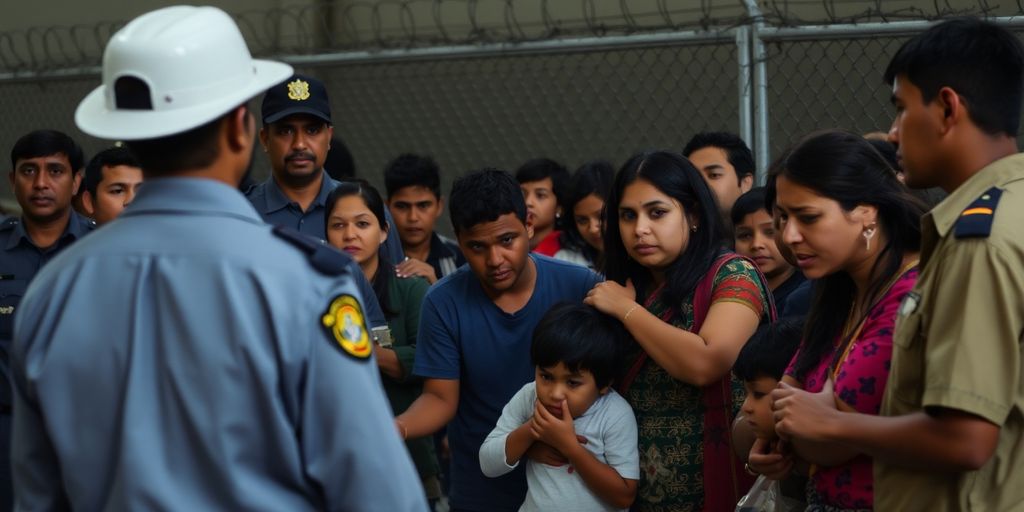Child Welfare
Legal Turmoil: Trump Administration’s Controversial Deportation Policies Under Fire

The Trump administration is facing significant legal challenges over its controversial deportation and refugee policies, particularly regarding the deportation of migrants to third countries without due process. A federal judge has warned that these actions may violate court orders, raising serious human rights concerns.
Key Takeaways
- A federal judge ruled that the Trump administration violated a court order by deporting migrants to countries where they have no ties.
- The administration is using third countries for deportations, which has led to legal challenges and accusations of human rights violations.
- The U.S. has suspended its refugee program but is fast-tracking refugee status for white South Africans, raising allegations of racial bias.
Court Rulings and Legal Challenges
A federal judge in Massachusetts, Brian Murphy, has indicated that the Trump administration’s recent deportations may breach his court order. The order prohibits deporting migrants to countries where they lack connections without providing them a meaningful opportunity to contest their removals. This ruling came after reports surfaced that a flight carrying deported migrants landed in South Sudan, a country known for its instability and human rights issues.
- Judge’s Concerns: Murphy expressed that the rapid deportation of migrants, some of whom were reportedly convicted criminals, did not allow for adequate legal representation or the chance to contest their deportation.
- Potential Contempt of Court: The judge hinted at the possibility of holding the administration in contempt for these actions, emphasizing the need for due process.
Human Rights Implications
The United Nations and various human rights organizations have raised alarms about the treatment of deported individuals. Reports indicate that many deportees, particularly from Venezuela and El Salvador, are being sent to harsh detention facilities without access to legal counsel or family contact.
- Detention Conditions: Detainees in El Salvador’s notorious prison, CECOT, face severe treatment, raising concerns about their safety and rights.
- Lack of Transparency: Families of deported individuals have reported feeling powerless and distressed due to the lack of information regarding their loved ones’ whereabouts and conditions.
Controversial Refugee Policies
In a stark contrast to its deportation policies, the Trump administration has expedited refugee applications for white South Africans, citing claims of racial discrimination against them. This move has drawn criticism for its perceived racial bias, especially as the administration has suspended refugee admissions from other regions, including war-torn countries.
- Fast-Tracked Refugees: A group of 59 white South Africans recently arrived in the U.S. under this expedited process, while thousands of other refugees remain in limbo due to the suspension of the refugee program.
- Criticism from Human Rights Groups: Organizations like Human Rights Watch have condemned the administration’s actions as racially motivated, arguing that it undermines the plight of other refugees who are genuinely in need of protection.
Conclusion
The legal and ethical implications of the Trump administration’s deportation and refugee policies continue to unfold, with significant pushback from the judiciary and human rights advocates. As the administration seeks to enforce its immigration agenda, the balance between national security and human rights remains a contentious issue, drawing scrutiny from both domestic and international observers.
Sources
- Judge says Trump administration violated court order on third-country deportations : NPR, NPR.
- US deportations raise serious human rights concerns, UN News.
- White South Africans arrive in US under Trump refugee plan, BBC.
- Trump suspended the refugee program. Why is he inviting white South Africans to find a new home in the U.S.?
| PBS News, PBS. - Judge warns US deportations to South Sudan may breach court order, BBC.
-

 Press Release3 days ago
Press Release3 days agoNura Labs Files Revolutionary Patent: AI-Powered Wallet Solves the $180 Billion Crypto Staking Complexity Crisis
-

 Press Release23 hours ago
Press Release23 hours agoGlobal Compound Feeds and Additives Industry Report: Market Expansion and Competitive Insights to 2035
-

 Technology22 hours ago
Technology22 hours agoWhat to Know Before Switching Cell Phone Network Services in 2025















